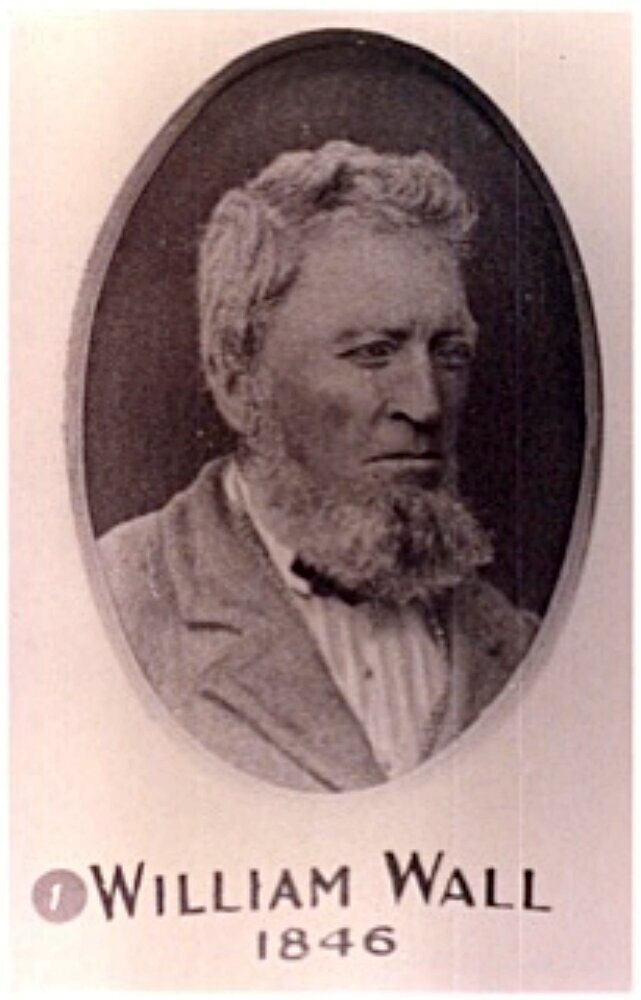When Whall became Wall
William ‘Cocky’ Wall became a pioneer of note in the Warrnambool district
The central character of my father’s line in Australia is a man we know as William Wall. William’s transportation to Van Diemen’s Land in 1835 was the catalyst that broke all direct links to his home country and family. The mystery behind the circumstances of William’s arrest is why he used his mother’s family name and not his father’s. It was William’s mother, Martha Whall, who travelled to Horncastle to rescue her son; an extraordinary woman who we never get to know fully or give her sufficient voice in William’s story.
Through William’s incarceration and trial records, we learned Martha Whall (born in 1782) was William’s mother and that she was wife to William Lamb (born in 1781), father of my William ‘Cocky’ Wall.
William Lamb (my William's father), born on 31st January 1781 in Norwich, England, was a lace weaver and a son of Norfolk through his parents William Lamb snr and Ann Trull. The Lambs and Trulls had been Norfolk people since the mid-1500s coming mainly from the City of Norwich. William Lamb married Martha Whall on Christmas Day in1804 in Norwich.
William Lamb and Martha Whall’s son, William, was born on 10th May 1817. The traceable story of young William surfaces when as a 17-year-old groomsman come labourer, he was arrested on 29th October 1834 in Horncastle, Lincolnshire, England, during the annual horse fair. William's job as a groomsman took him to Horncastle in 1834, where horse-trading and all the associated activities saw lots of cash passed about. According to Court Clerk and Justice of the Peace the Reverend John Dymoke’s report, written on the day of the arrest, William attempted to assault and rob gentleman farmer, Mr James Scrooby of £60 while in a crowd watching a fight in the back of the Vine Beer House in Horncastle.
Scrooby was a mature-aged farmer from Belchford who carried an extraordinary amount of cash in his pocket that day, implying he was a successful farmer and gentleman of influence. Scrooby’s damning testimony against William was supported by a witness, Mr James Marshall, farmer of Langton, who happened to be a constable of Langton.
William denied the charges of felony, asserting he was leaning over a man’s shoulders to watch a fight that broke out in the beer house when a gentleman grabbed him by the collar accusing him of trying to rob him. Court documents support Marshall’s occupation as a constable and farmer from Langton. With the prosecution witness being a constable, William’s defence case was weak.
Martha’s father, John Whall, is referred to as Wall and Whall concurrently in various records. The reasoning for William using his mother’s maiden name remains a conundrum. Sometime in early 1835 or perhaps late 1834, Martha Lamb (neé Whall) travelled from Norwich in Norfolk, to Horncastle, to fight against her son’s transportation order. She stayed in a guest house in Millstone Street owned by Francis and Ann Marshall.
Between 23rd January and 18th February 1835, Martha put together a petition seeking clemency for her son, with an accompanying letter to the Right Honourable Lord Goulburn dated 18th February. Her son was by this stage incarcerated on a prison hulk at Woolwich. The petition was supported by 33 citizens of Horncastle, all willing to vouch for the lad’s good character. The petition aimed to seek clemency for William on several grounds, including mistaken identity, an assertion that the witness for the prosecution was intoxicated, and while incarcerated in Spilsby Prison, William had also shown good conduct (The National Archives, n.d.). Throughout this horrific episode for Martha, she used her family name and not that of her husband’s, implying a close bond with her son.
